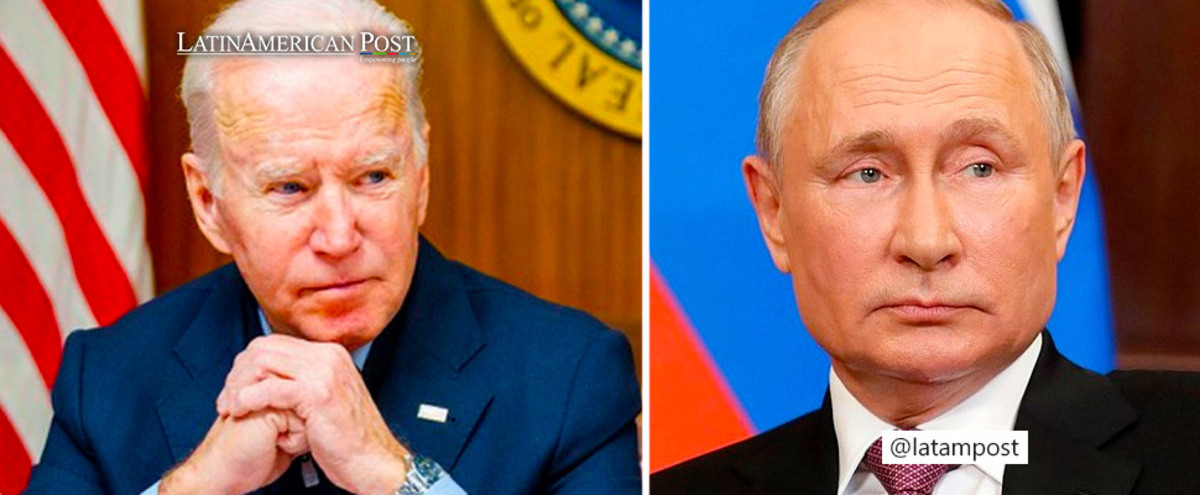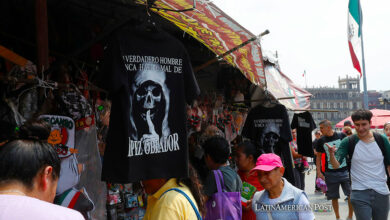The U.S. State Department has leveled serious allegations against Russia, claiming it is orchestrating a sophisticated disinformation crusade across Latin America to erode support for Ukraine and sow discord against Western alliances.

Photo: The White House, kremlin.ru
Latin American Post Staff
Escucha este artículo
Leer en español: Estados Unidos señala la supuesta campaña de propaganda de Rusia en América Latina
Unmasking Russia's Alleged Disinformation Campaign in Latin America
Amidst the geopolitical chess game of narratives and counter-narratives, the United States has cast a spotlight on what it describes as a covert Russian campaign to manipulate public opinion across Latin America. In a statement that cuts through the noise of global media, the U.S. has accused Russia of strategically disseminating propaganda and fake news designed to undermine support for Ukraine and fan flames of anti-American and anti-NATO sentiment.
The State Department's announcement pulls back the curtain on the Kremlin's endeavor to infiltrate local media outlets with content crafted to resonate with and deceive Latin American audiences. This alleged disinformation drive seeks to masquerade Russian interests as indigenous perspectives, blurring the lines of authenticity in journalism.
Escalating Charges: Washington's Broad Campaign Against Russian Influence
While the Russian embassy's silence post-allegation hangs in the air, the State Department's charges have escalated Washington's broader campaign to neutralize Russia's global influence operations, which the U.S. claims are aggressively targeting the integrity of democratic institutions and processes.
On the heels of an October release of a declassified intelligence report sent to a roster of over 100 nations, the U.S. is painting a picture of a Kremlin at work on all fronts. The report accuses Russia of a calculated use of espionage, social media manipulation, and state-run media to erode public trust in democratic elections. This narrative now extends into Latin America's media landscape.
Spreading Threads of Misinformation: Russia's Alleged Reach
According to the U.S. narrative, Russian agents have extended their tendrils across Argentina, Bolivia, Chile, Colombia, Cuba, Mexico, Venezuela, Brazil, Ecuador, Panama, Paraguay, Peru, and Uruguay. Here, they allegedly weave threads of misinformation, subtly knitting anti-Ukrainian and anti-Western sentiment into the fabric of regional discourse.
Identified as the masterminds behind this "information manipulation campaign" are three Russian organizations—The Social Design Agency (SDA), the Institute for Internet Development, and Structura. The U.S. labels these groups as "influence-for-hire" entities that have allegedly compromised local media and influencers in a bid to launder Russian propaganda through seemingly trustworthy channels.
International Response: Sanctions and Scrutiny
The response from the international community has not been without action. In July, the European Union placed sanctions on SDA and Structura, directly accusing them of propping up Russia's military aggression against Ukraine with a veneer of propagandistic support.
Allegedly, Russian teams generate content funneled to cooperative journalists in Latin America for refinement and distribution via mainstream media—a process aimed at disguising the origin and true nature of the information.
Pressenza and El Ciudadano, two Spanish-language online news platforms based in Ecuador and Chile, respectively, have been singled out by the State Department as primary vehicles for this suspect content. Pressenza's roots trace back to Milan, Italy, in 2009, with a subsequent establishment in Ecuador in 2014, while El Ciudadano presents itself as a local Chilean outlet. Both now find themselves under the scrutiny of U.S. intelligence as conduits of Kremlin-influenced narratives.
This latest accusation from the United States casts a long shadow over the complex interplay of global geopolitics and media integrity. It is a narrative that serves as a cautionary tale, reminding international audiences of the increasingly sophisticated efforts to shape perceptions and policies by weaponizing information.
Also read: 4 Keys to Biden's Tour: From the Megaproject Against China to the Association With Vietnam
The New Frontier: Perception vs. Power
As this international drama unfolds, the battle lines are being drawn across the physical territories but within the domain of the mind. With the U.S. shining a light on these alleged covert operations, the global community realizes that the next frontier of international conflict may lie in the struggle to control the narrative. This battle is as much about perception as it is about power.




